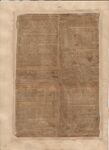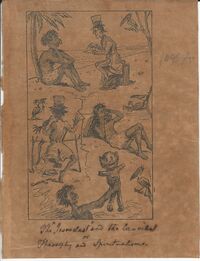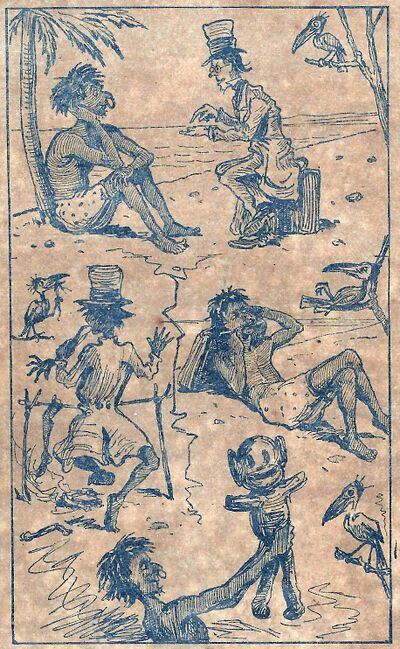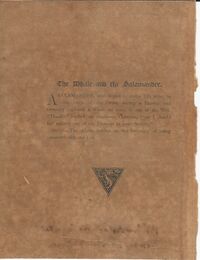 |
vol. title: vol. period: 1876-1878 pages in vol.: 247 HPB's note in different handwriting. The page has inlay. |
Psychological Phenomena
Mons. Vautier, of Caen, recounts the following in the Revue Spirits (Paris):—
“Dining with some retired officers, our conversation turned upon M. Thiers, who, I said, now lives under another form. ‘This is rank Spiritualism,’ said one of my companions. True; and I will add some facts in keeping with this faith. One of my friends had made a will in favour of her husband; but reflecting that, in case of her death, her property would all pass to a family of strangers, she wished to revoke it, and desired her husband to give it up; but he absolutely refused. The house, the furniture, everything was searched for it, but to no purpose. Eight days later, when asleep a voice came to her and distinctly said: ‘You have searched a long time for the paper that has caused your quarrels; open the cartridge box and in the bottom of it you will find the testament.’ It was there found and at once put into the fire.
“’Now let me relate,’ said one of the captains. (My wife was once chloroformed, and began speaking English with a British accent. The doctor asked if she were English. Greatly astonished myself, I declared that she did not know a word of that language, and had never been in England. I could not comprehend it, and still seek a solution. ‘The spiritual doctrine,’ I replied, ‘explains it. In another existence Mme. X. was English.’ . . . The doctrine of a plurality of existences was declared to be full of good sense.
“Subsequently, as we strolled along the shore, admiring the grandeur of the sea, I related the following: ‘During the siege of Rome in 1848,1 had for a comrade a sub-officer of my regiment to whom I was much attached. One morning I found him waiting outside of our tent with a face pale and haggard. Asking the cause, he said: ‘Within three days I shall be dead.’ ‘You have been dreaming,’ I replied. ‘No, it is not a dream,’ he added, ‘for my poor mother has distinctly told me this morning: ‘Prepare yourself, my child; within three days you will be with us. Have courage, and God will reward you.’” I employed all the means I could to distract his attention from the subject. ‘Friend,’ he replied, “I thank you for your good heart; but it is of no avail.’ Three days afterward the cannon roared, and we placed together tirailleurs on the platform of a house, did our duty. The explosion of an obus broke the leg of my comrade. That night from loss of blood he passed away. He had. told the doctor of the uselessness of his efforts, and crossing his hands upon his breast, the brave young man died without a murmur.”—Dr. Ditson in the “Banner of Light.
Mr. W. J. Colville will give
Mr. W. J. Colville will give his last evening trance address at the Langham Hall next Monday, when it is to be hoped he will be well supported, since he has been doing his utmost to establish regular inspirational public addresses in London. Next Sunday, at 11.15 a.m., and 3.15 p.m., he will give trance addresses at 429, Oxford-street, London; admission free. Last Sunday his guides lectured against the views of the Theosophists, as laid down by Colonel Olcott.
Problems
Sir,—It is hardly worth while to encumber your columns with any notice of Mr. for is it Mrs.?) La Roy Sunderland’s strange fancies; but, to avoid misrepresentation, I will ask to be allowed to say that I have never “confessed my inability to solve any problems,” save those that trench on the domain of Omniscience. I did hut mildly hint that my querist was asking questions which are (in the strict etymological sense of the word) impertinent, and which, moreover, were phrased in language which even their author, I should think, could not comprehend.
Spirit Drapery
Sir,—Mr. Coleman is right about the drapery. Some of it is undoubtedly brought in, but whence? Some, again, is apparently woven on the spot, but how? I suspect, if I were permitted to cut off a piece from the drapery which I saw evolved under my gaze with Monck or Eglinton, that I should find it very like Manchester goods. The forms have very various qualities of drapery, and at private seances, where no public medium was present, and where no materialisation was presented, I have felt drapery that varied with the conditions from the substance of the finest lawn to that of a Turkish towel. I have a bit, cut off from a very fine specimen, so presented, and it is permanent enough, though the remainder vanished. Does that prove it to be “a fabric of earth”? We do not know as yet.
As to the weight of the forms, Mr. Coleman must remember, I think, an experiment recorded by Col. Olcott, when Katie King varied in weight very considerably, and apparently at will. The weight in some cases was quite at variance with the size and stature of the form. I think similar experiments have been made by other investigators, but until they have been frequently repeated, wo cannot say anything definite on the weight of these figures.
What effects the mighty magician can produce? and what material he uses? whether from the sitters anything? and if so, what is taken? whether the forms are wholly fabricated as our bodies are? and if so, how? and of what matter they are structured? what the method of building up? and who is the artificer?—these are questions that remain for solution.
The Psychological Society of Great Britain
At a recent meeting of the Psychological Society, held at 11, Chandosstreet, Cavendish-square, London, Mr. Serjeant Cox presided.
Mr. Serjeant Cox opened a discussion on the subject of “Trance,” and allied phenomena, by describing the physiological symptoms. He added, that in that state the body could live for a long time with scarcely any food, and that the case of the “fasting girl” in Wales was a shameful one, in the matter of the parents having been punished, in consequence of the ignorance of medical men about such abnormal states. Where there was so little drain upon food for muscular exertion, more sustenance than might be supposed was possibly derived from the air, as in the case of orchids. As to the mental and physical phenomena presented by mediums in and out of the trance state, the more he saw of the phenomena, the more convinced was he that they originated with the spirit of the medium in another state of consciousness. The communications were just those which the medium would be likely to give; and the descriptions of “heaven” and the next world, always agreed with the particular ideas of the particular sensitive. He had seen materialised hands and arms coming from a medium whose hands were held; they were like those of the medium, and he believed that they were produced by himself in some abnormal way.
Mr. Desmond Fitz-Gerald pointed out that the chemical conditions which sustained plants in air were the opposite of those which would sustain the life of animals.
Mr. W. H. Harrison admitted that Mr. Serjeant Cox’s theory fitted the phenomena observed at a certain proportion of seances, but thought that Dr. Carpenter’s example of straining one hypothesis to cover everything should be avoided. He should like to know how the phenomena in those haunted houses in which no mediums were present, could be explained by the “spirit-of-the-medium” theory. Lord Townsend’s once-haunted house at Rainham might be taken as an example. And if Mr. Serjeant Cox were alone in a haunted house, and witnessed the phenomena, who should he conclude to be the medium?
Mr. Serjeant Cox said that he had spoken only of the phenomena through mediums, and not those of haunted houses. The latter might, perhaps, be produced by some order of sub-human spirits; at all events, if they knew more than men they were very clever in concealing their knowledge. (Laughter.)
Mr. Harrison wished to know, supposing the various guests at Rainham to have recognised the ghostly “Brown Lady” as a person who once lived in the house, would Mr. Serjeant Cox think her to be the spirit of that person, or a ghostly “counterfeit presentment’’ industriously manufactured by sub-human goblins.
The President reminded the listeners that he was only speaking hypothetically. He did not admit the reality of haunted houses; before doing so he should like to see one. (Hear, hear.)
Shortly afterwards the proceedings closed.
At a meeting of the Psychological Society held on Thursday last week, Mr. F. K. Munton, honorary secretary, read from The Spectator Mr. Alfred R. Wallace’s letter on some remarkable slate-writing phenomena he had witnessed, which letter has already been published in The Spiritualist.
The Rev. W. Stainton-Moses, M.A., in opening a discussion on the subject, suggested that the word “psychography” should be adopted to describe writing produced without human hands, in the presence of Dr. Slade and various mediums. There was no doubt as to the reality of the phenomenon. Their president, Mr. Serjeant Cox, had recorded in The Spiritualist how he heard, felt, and afterwards saw writing upon the under side of a slate which he had cleaned, and laid in broad daylight over a crumb of pencil, placed on the top of Dr. Slade’s table. Mr. Adshead, of Belper, Derbyshire, had recorded how he had obtained writing in Dr. Monck’s presence on a locked folding slate, placed inside a box, the lid of which was fixed on by means of a number of nails hammered in by various sitters. Then, again, Miss Kislingbury had obtained slate-writing in America, under unexceptionable test conditions. Mr. Hensleigh Wedgwood, M.R.I., stated that he once cleaned and tied together two slates, with a crumb of pencil between them; he did not let them go out of his sight, yet in Dr. Slade’s presence obtained upon them along quotation in Greek, a language which he believed that Dr. Slade did not understand.
The Rev. Thomas Colley, late Curate of Portsmouth, said that on the previous evening he and four other sitters had two slates apiece, upon which they wrote questions beforehand, then tied the slates together. None of the questions had been seen by the medium, yet all were correctly answered in writing between the slates. One pair of slates was at request taken through a closed door and placed upon a particular step in the passage, while Dr. Monck, the medium, remained in the room. Mr. Wedgwood, who was present, asked that a slate and a card with names on it, should be carried two miles and slipped into the letter box of his house; this was done, two of the sitters remained with Dr. Monck, while the other three went in a cab to ascertain the result. The writing in Mr. Adshead’s nailed box answered questions previously written out, and in Mr. Adshead’s pocket at the time they were answered.
Dr. Carter Blake remarked that he had had many seances with that most honourable man and excellent medium, Dr. Slade. (Loud applause.) One gentleman had obtained writing in Dr. Slade’s presence upon a slate fastened round with a strap, and padlocked by himself. He (Dr. Blake) bought a book-slate, with heavy tinned-iron covers and heavy hinges, and put a fragment of his own pencil between the covers; that slate was never in Dr. Slade’s possession, and never out of the possession of himself (Dr. Blake), who held it in his own hand, without Dr. Slade touching it, and in twelve or fifteen seconds a message was written lengthways on the slate, Once a friend of his obtained writing in Spanish and Portuguese, of which languages he believed Dr. Slade to know nothing. Between Slade’s phenomena and conjuring tricks performed by ordinary men, there was a vast chasm, which he hoped the Psychological Society would never attempt to bridge over. (Applause.)
Mr. Munton.—Were you in the room when Spanish and Portuguese writings were obtained?
Dr. Carter Blake.—No. I was in the next room.
Mr. Munton.—Can you speak those two languages?
Dr. Carter Blake.—Yes. I am one-quarter Spaniard.
Dr. George Wyld said that once he held a slate in his hand, which he would not let Dr. Slade touch; he put it on the table, under his own arm, and upon it there came a message to his two brothers, signed with the names of his father and mother. (Cheers.) He did not believe implicitly that the message came from his father and mother; he thought that it was written by Slade’s spirit, unknown to the living man. Lankester argued that there was no time to write a message before he found one on the slate. He (Dr. Wyld) returned to Slade to “sit for time,” and after two or three trials obtained in three-quarters of a second the words “Let this convince you,’’ words which it takes human beings three seconds to write.
Mr. C. C. Massey never heard Slade’s name mentioned, without rising to say that the writing was not produced by the trickery of the medium. He thought the word Spiritualism objectionable as applied to this phenomenon, and that the word caused a vast amount of unnecessary prejudice; he thought that the spirit of the medium had a large share in the production of the writing. At the same time he was a Spiritualist, and believed that certain other phenomena gave evidence of the presence of the spirits of the departed.
Mr. Serjeant Cox said that there was no doubt as to the reality of the fact of this abnormal production of writing. He first witnessed it with Forster; afterwards with Slade, in the manner already stated. A lady in private life, who would not let her powers be generally known, because of the outrageous abuse showered upon mediums—and he did not blame her—had obtained quantities of writing while quietly eating her dinner, and holding a slate briefly under the table with one hand when requested. A conjuror might get writing under these conditions, but not a lady in private life. He believed that the writing was produced by the spirit of the medium.
The discussion was then adjourned.
The hall, at this meeting, was full to overflowing; some of the listeners had to be accommodated with seats outside the open door.
<Untitled> (There is some probability that Madame Blavatsky)
There is some probability that Madame Blavatsky will visit England shortly en route for India.
Inlay



The Whale and the Salamander
A salamander, who hoped to strike Oil, went to the brink of the Ocean during a Shower and earnestly implored a Whale to come in out of the Wet. “Thanks,” replied the courteous Cetacean, “but I should feel entirely out of my Element in your Society.”
Moral. – The Above teaches us the Propriety of being contented with our Lot.

Editor's notes
- ↑ Psychological Phenomena by Ditson, London Spiritualist, No. 279, December 28, 1877, p. 303. From the "Banner of Light"
- ↑ Mr. W. J. Colville will give by unknown author, London Spiritualist, No. 277, December 14, 1877, p. 282
- ↑ Problems by Moses, W. S. (signed as M. A. (Oxon)), London Spiritualist, No. 277, December 14, 1877, p. 288
- ↑ Spirit Drapery by Stainton, Mozes W., London Spiritualist, No. 277, December 14, 1877, p. 288
- ↑ The Psychological Society of Great Britain by unknown author, London Spiritualist, No. 277, December 14, 1877, p. 282
- ↑ There is some probability that Madame Blavatsky by unknown author
- ↑ image by unknown author
- ↑ The Whale and the Salamander by unknown author
- ↑ image by unknown author
Sources
-
London Spiritualist, No. 279, December 28, 1877, p. 303
-
London Spiritualist, No. 277, December 14, 1877, p. 282
-
London Spiritualist, No. 277, December 14, 1877, p. 288



